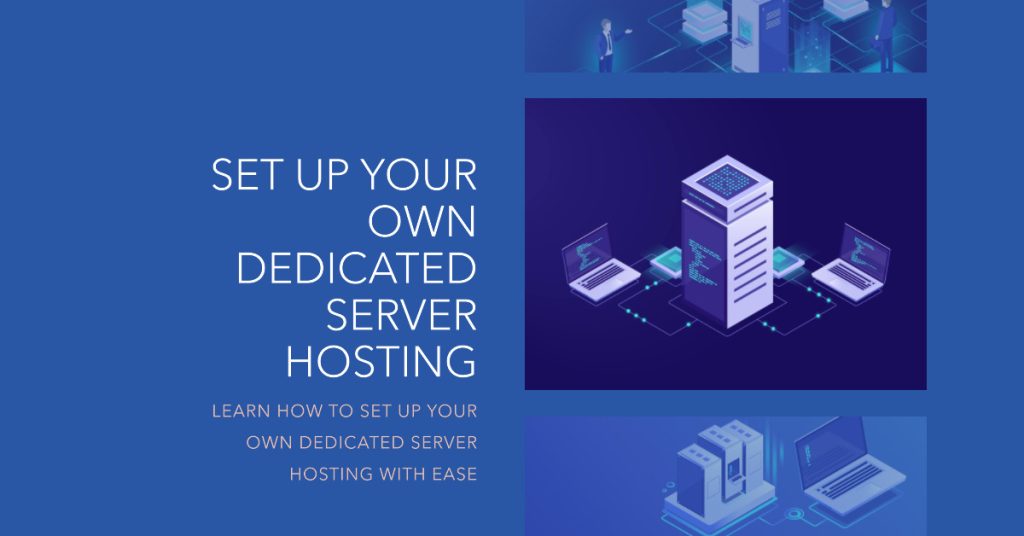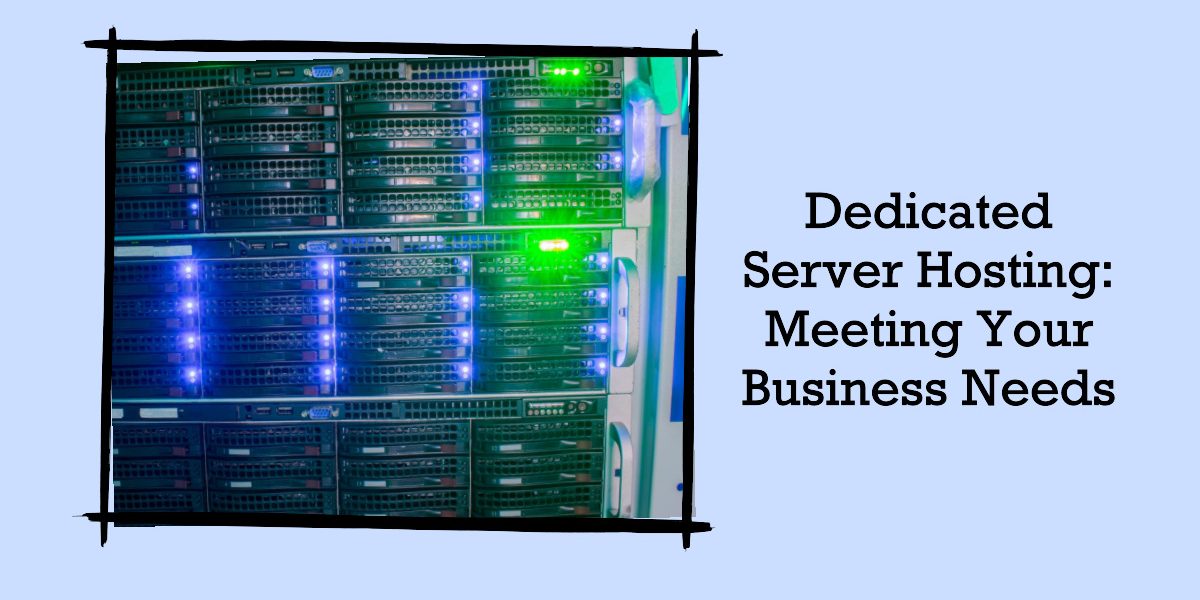Managed Dedicated web hosting is a type of web hosting that provides businesses with exclusive access to a physical server. This means that businesses have complete control over the server’s resources, including its CPU, RAM, storage, and bandwidth. Dedicated server hosting is a good option for businesses that need high performance, reliability, and security for their websites and applications.
What is Dedicated Hosting
Dedicated hosting is a powerful and exclusive web hosting arrangement where an entire server is dedicated to a single user or client. In this hosting model, the client has complete control and access to the server’s resources, including processing power, memory, storage, and bandwidth. Unlike shared hosting, where multiple users share the same server resources, dedicated hosting provides a more robust and customizable solution, making it ideal for websites with high traffic volumes, resource-intensive applications, or specific performance requirements.
The key features of dedicated hosting include enhanced performance, as the client has the entire server’s resources at their disposal, resulting in faster loading times and improved overall website responsiveness. Additionally, dedicated hosting offers greater flexibility, allowing users to configure the server environment based on their unique needs, install custom software, and implement security measures tailored to their specific requirements.
Dedicated hosting is particularly advantageous for large enterprises, e-commerce websites, and applications with demanding resource needs. It ensures a higher level of security and reliability compared to shared hosting, as the client has exclusive control over server access and configurations. While dedicated hosting typically comes at a higher cost than shared or virtual hosting options, the benefits of performance, control, and security make it a preferred choice for businesses and organizations with critical online operations.
Benefits of Managed Dedicated Web Hosting
There are many benefits to using dedicated server hosting, including:
- Improved performance: Dedicated servers are typically much more powerful than shared servers, which means that they can handle more traffic and more demanding applications. This can be especially important for small businesses that are growing rapidly or that have high-traffic websites or applications.
- Increased reliability: Dedicated servers are less likely to experience downtime than shared servers, because they are not affected by the performance of other websites on the server. This is important for small businesses that need to ensure that their websites and applications are always available to their customers.
- Enhanced security: Dedicated servers offer a higher level of security than shared servers, because businesses have complete control over the server’s configuration and software. This is important for small businesses that need to protect their sensitive data, such as customer information and financial data.
- Scalability: Dedicated servers can be scaled up or down to meet the changing needs of a business. This is important for small businesses that are growing or that have seasonal traffic fluctuations.
- Cost-effectiveness: Dedicated server hosting can be a cost-effective solution for small businesses that need high performance, reliability, and security. Over time, the cost of dedicated server hosting can be less than the cost of shared hosting, especially for businesses that have high traffic or demanding applications.
When to Use Dedicated Server Hosting

Dedicated server hosting is an excellent choice for specific scenarios where the benefits of having an entire server dedicated to a single user or organization outweigh the associated costs. Here are situations where dedicated server hosting is particularly advantageous:
- High Traffic Websites:
- Ideal for websites with high traffic volumes, such as e-commerce sites or popular online services.
- Dedicated servers provide the necessary resources to handle increased traffic without affecting loading times or causing downtime.
- Resource-Intensive Applications:
- Suited for running resource-intensive applications or services requiring significant processing power, memory, or storage.
- Dedicated servers offer ample resources to ensure smooth and efficient operation for demanding computational requirements.
- Data Security and Compliance:
- Essential for businesses dealing with sensitive data or industries with strict regulatory compliance requirements (e.g., finance, healthcare).
- Dedicated servers provide enhanced security measures and allow customization to meet specific compliance standards, ensuring data integrity and privacy.
- Custom Software Configurations:
- Perfect for using custom software configurations or specialized applications requiring specific server settings.
- Dedicated servers grant users full control over the server environment, allowing tailored configurations to match unique software requirements.
- Gaming Servers and Virtualization:
- Ideal for hosting multiplayer online games or implementing virtualization technologies for multiple virtual machines.
- Dedicated servers offer stability and performance needed for seamless gaming experiences or efficient virtualization without resource contention.
- Exclusive Resource Access:
- For organizations requiring exclusive access to server resources without sharing with other users.
- Dedicated servers provide isolated resources, eliminating risks associated with “noisy neighbors” on shared hosting platforms.
- Predictable Performance:
- Suitable for businesses prioritizing consistent and predictable server performance.
- With dedicated resources, users can expect stable and reliable performance without fluctuations caused by other users’ activities.
- Advanced Technical Control:
- Ideal for users requiring advanced technical control over server configurations, security settings, and software installations.
- Dedicated servers offer complete root or administrator access, allowing users full control and customization capabilities.
- Hosting Multiple Websites:
- Efficient for hosting multiple websites with varying requirements or diverse content.
- Dedicated servers enable hosting multiple websites with individualized configurations and resource allocations for each site.
- Large-Scale Applications:
- Perfect for deploying large-scale applications, databases, or enterprise-level software solutions.
- Dedicated servers provide the necessary infrastructure to support extensive applications and databases with high concurrent user access.
In summary, dedicated server hosting is a suitable choice when performance, control, security, and customization are top priorities for your hosting needs. It ensures that resources are exclusively available for a specific user or organization, offering a robust solution for various demanding scenarios.
Types of Dedicated Server Hosting
There are 4 types of Dedicated Server Hosting Available. The basic information and key features about them are given below in the table:
| Hosting Type | Description | Suitable For | Key Features |
|---|---|---|---|
| Managed Dedicated Hosting | Ideal for businesses lacking in-house expertise to manage servers. The hosting provider handles all aspects of server management. | – Businesses without a dedicated IT team for server management. | – Full server management by the hosting provider, including hardware, software maintenance, security, and performance monitoring. |
| Unmanaged Dedicated Hosting | Suitable for businesses with in-house expertise to independently manage servers. The business takes full responsibility for server management. | – Businesses with a dedicated IT team capable of handling server management. | – Complete control and customization by the business for server configuration and management. |
| Semi-Managed Dedicated Hosting | A middle-ground option offering a blend of provider-managed and client-managed services. The hosting provider handles specific tasks, leaving others to the client. | – Businesses with specific needs, where some aspects require expert management, and others can be handled by the client. | – Partial server management by the hosting provider, allowing clients to focus on specific areas while offloading other responsibilities. |
| Self-Managed Dedicated Hosting | Similar to unmanaged hosting, but with additional tools and support provided by the hosting provider for the client’s independent management. | – Businesses seeking independence in server management but with access to tools and support for enhanced control. | – Hosting provider offers tools, resources, and support to aid client-managed server tasks. |
These categories provide a nuanced view of dedicated server hosting options, considering the level of management required and additional variations like semi-managed and self-managed hosting. Each type caters to different business needs and IT capabilities.
Choosing a Dedicated Server Hosting Provider
Selecting the right dedicated server hosting provider is a crucial decision that can significantly impact the performance and security of your online operations. Here are key factors to consider when choosing a dedicated server hosting provider:
- Performance and Reliability:
- Evaluate the provider’s infrastructure, including the quality of their data centers, network capabilities, and hardware specifications. Look for providers with a history of high uptime and reliable performance.
- Scalability:
- Assess the provider’s ability to scale resources as your business grows. A flexible hosting solution should allow you to easily upgrade or downgrade server resources based on your evolving needs.
- Security Measures:
- Prioritize providers with robust security protocols, including firewalls, DDoS protection, and intrusion detection systems. Ensure they follow industry best practices for safeguarding your data.
- Support and Customer Service:
- Check the level of customer support provided, including response times, availability, and expertise. A hosting provider with responsive and knowledgeable support is crucial for resolving issues promptly.
- Managed Services:
- Determine whether you need fully managed, semi-managed, or unmanaged hosting. Choose a provider that aligns with your preferred level of control and management responsibilities.
- Cost and Value for Money:
- Compare pricing plans and understand the overall value for the services offered. Be wary of hidden fees and consider the long-term cost implications of the chosen hosting solution.
- Server Customization:
- Look for providers that allow customization of server configurations. This ensures you can tailor the server specifications to meet your specific application and performance requirements.
- Network Speed and Bandwidth:
- Consider the provider’s network infrastructure, including the available bandwidth and data transfer speeds. A fast and reliable network is essential for optimal website and application performance.
- Backup and Disaster Recovery:
- Check the provider’s backup and disaster recovery policies. Regular data backups and a solid recovery plan are crucial for minimizing data loss and downtime in case of unforeseen events.
- Reviews and Reputation:
- Research customer reviews and testimonials to gauge the experiences of other users. A provider with a positive reputation for service quality and reliability is more likely to meet your expectations.
- Compliance and Certifications:
- Ensure the provider adheres to industry regulations and standards. Certifications such as ISO, SOC, or PCI compliance demonstrate a commitment to security and quality service.
- Location of Data Centers:
- Consider the geographical location of the provider’s data centers. Choosing data centers close to your target audience can improve latency and response times for your users.
By thoroughly evaluating these factors, you can make an informed decision when selecting a dedicated server hosting provider that aligns with your business goals and technical requirements.
How to Setup Dedicated Server Hosting
Once you have chosen a dedicated server hosting provider, you will need to set up your server. This process will vary depending on the provider, but it will typically involve the following steps:

Planning and Initial Setup
Choose a Dedicated Server Hosting Plan: Select a plan based on your performance, storage, and bandwidth needs. Consider managed services if lacking in-house expertise.
Select an Operating System: Choose between Linux distributions (e.g., Ubuntu, CentOS) or Windows Server, based on your application requirements.
Configure Server Hardware: Adjust BIOS settings, set up RAID configurations, and ensure all hardware components are correctly connected.
Software and Security Implementation
Install Control Panel (Optional): Consider user-friendly control panels like cPanel or Plesk for easier server management.
Security Measures: Implement firewalls, intrusion detection systems, and antivirus software. Regularly update and patch both the OS and applications.
Configure Network Settings: Set up IP addresses, DNS settings, and network interfaces. Use static IP addresses for stability.
Backup and Disaster Recovery: Establish a robust backup and disaster recovery plan. Regularly back up critical data and configurations.
Install Necessary Software: Install required software and applications, including web servers, databases, etc.
SSL Certificate Installation (If Needed): Install SSL certificates for websites requiring secure connections.
Monitoring and Testing
Monitor Server Performance: Set up monitoring tools to track server performance, resource usage, and potential issues.
Test Server Functionality: Conduct thorough testing to ensure correct configurations and intended functionality.
Documentation, Maintenance, and Scaling
Document Configuration Details: Keep detailed documentation of server configuration, login credentials, and network settings for troubleshooting and reference.
Scale Resources as Needed: Consider scaling CPU, RAM, and storage as your requirements grow. Most hosting providers allow easy upgrades.
This comprehensive guide provides a step-by-step approach to setting up dedicated server hosting, ensuring a stable and secure environment for your applications and websites.
Managing Your Dedicated Server Like a Pro

Once your dedicated server is set up, you will need to manage it. This includes tasks such as:
Step 1: Access Server Control Panel
Log in to your hosting provider‘s control panel using the provided credentials. This is where you can manage various aspects of your dedicated server.
Step 2: Review Server Information
Explore the control panel to find details about your server, including specifications, IP addresses, and resource usage. This information is crucial for server management.
Step 3: Monitor Server Performance
Use monitoring tools within the control panel to track CPU usage, memory consumption, and network activity. Identify any anomalies that may indicate performance issues.
Step 4: Configure Security Settings
Access security settings to configure firewalls, intrusion detection/prevention systems, and implement SSL certificates. Regularly update passwords and ensure secure access.
Step 5: Set Up Backups
Implement an automated backup solution to regularly back up your data. Configure backup frequency, retention periods, and verify the restoration process.
Step 6: Install and Update Software
Install necessary software and keep them updated. This includes the operating system, web server software, databases, and any applications running on the server.
Step 7: Manage User Access
Create and manage user accounts with appropriate permissions. Restrict access to sensitive areas and regularly audit user accounts for security.
Step 8: Handle Domain and DNS Settings
If your server hosts websites, manage domain settings and ensure that DNS configurations are accurate. Update DNS records as needed.
Step 9: Troubleshooting and Logs
Regularly check server logs for errors or unusual activities. Develop a troubleshooting plan and address issues promptly. Utilize error logs for diagnostics.
Step 10: Scale Resources as Needed
Monitor resource usage trends over time. If your server experiences increased demand, work with your hosting provider to scale resources like CPU, RAM, or storage.
Step 11: Maintain Documentation
Keep detailed documentation of server configurations, software installations, and changes made over time. This aids in troubleshooting and future planning.
Step 12: Utilize Technical Support
In case of issues or uncertainties, reach out to your hosting provider‘s technical support. They can provide guidance and assistance to resolve complex problems.
Step 13: Stay Informed and Plan for the Future
Regularly update yourself on new technologies, security best practices, and advancements in server management. Plan for future upgrades or migrations to meet evolving business needs
Conclusion
In conclusion, Managed Dedicated web hosting stands as an indispensable solution for businesses of all sizes, delivering unparalleled performance, reliability, and security for websites and applications. The benefits, ranging from enhanced control to scalability and advanced technical customization, make dedicated hosting a strategic choice in the dynamic online landscape. Whether you’re navigating high traffic volumes, safeguarding sensitive data, or deploying resource-intensive applications, dedicated hosting empowers you to meet diverse challenges head-on. Selecting the right hosting provider, configuring your server adeptly, and managing it with diligence are vital steps in maximizing the advantages of dedicated server hosting. Stay informed, plan for the future, and elevate your online presence with the robust capabilities of Managed Dedicated Web Hosting.







